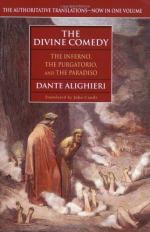CANTO XV
As much as ’twixt the third hour’s close
and dawn,
Appeareth of heav’n’s sphere, that ever
whirls
As restless as an infant in his play,
So much appear’d remaining to the sun
Of his slope journey towards the western goal.
Evening was there, and here the noon of night;
and full upon our forehead smote the beams.
For round the mountain, circling, so our path
Had led us, that toward the sun-set now
Direct we journey’d: when I felt a weight
Of more exceeding splendour, than before,
Press on my front. The cause unknown, amaze
Possess’d me, and both hands against my brow
Lifting, I interpos’d them, as a screen,
That of its gorgeous superflux of light
Clipp’d the diminish’d orb. As when
the ray,
Striking On water or the surface clear
Of mirror, leaps unto the opposite part,
Ascending at a glance, e’en as it fell,
(And so much differs from the stone, that falls
Through equal space, as practice skill hath shown);
Thus with refracted light before me seemed
The ground there smitten; whence in sudden haste
My sight recoil’d. “What is this,
sire belov’d!
’Gainst which I strive to shield the sight in
vain?”
Cried I, “and which towards us moving seems?”
“Marvel not, if the family of heav’n,”
He answer’d, “yet with dazzling radiance
dim
Thy sense it is a messenger who comes,
Inviting man’s ascent. Such sights ere
long,
Not grievous, shall impart to thee delight,
As thy perception is by nature wrought
Up to their pitch.” The blessed angel,
soon
As we had reach’d him, hail’d us with
glad voice:
“Here enter on a ladder far less steep
Than ye have yet encounter’d.” We
forthwith
Ascending, heard behind us chanted sweet,
“Blessed the merciful,” and “happy
thou!
That conquer’st.” Lonely each, my
guide and I
Pursued our upward way; and as we went,
Some profit from his words I hop’d to win,
And thus of him inquiring, fram’d my speech:
“What meant Romagna’s spirit, when he
spake
Of bliss exclusive with no partner shar’d?”
He straight replied: “No wonder, since
he knows,
What sorrow waits on his own worst defect,
If he chide others, that they less may mourn.
Because ye point your wishes at a mark,
Where, by communion of possessors, part
Is lessen’d, envy bloweth up the sighs of men.
No fear of that might touch ye, if the love
Of higher sphere exalted your desire.
For there, by how much more they call it ours,
So much propriety of each in good
Increases more, and heighten’d charity
Wraps that fair cloister in a brighter flame.”




